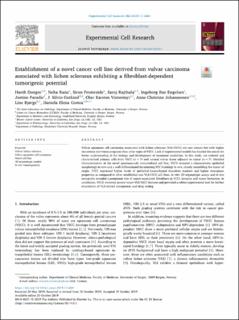Establishment of a novel cancer cell line derived from vulvar carcinoma associated with lichen sclerosus exhibiting a fibroblast-dependent tumorigenic potential
Dongre, Harsh; Rana, Neha; Fromreide, Siren; Rajthala, Saroj; Engelsen, Ingeborg Bøe; Paradis, Justine; Gutkind, J. Silvio; Vintermyr, Olav Karsten; Johannessen, Anne Christine; Bjørge, Line; Costea, Daniela Elena
Journal article, Peer reviewed
Published version

Åpne
Permanent lenke
https://hdl.handle.net/11250/2732902Utgivelsesdato
2020Metadata
Vis full innførselSamlinger
- Department of Clinical Medicine [2066]
- Registrations from Cristin [9791]
Sammendrag
Vulvar squamous cell carcinoma associated with lichen sclerosus (VLS-VSCC) are rare tumors but with higher recurrence and worse prognosis than other types of VSCC. Lack of experimental models has limited the search for better understanding of the biology and development of treatment modalities. In this study, we isolated and characterized primary cells from VSCC (n = 7) and normal vulvar tissue adjacent to tumor (n = 7). Detailed characterization of the novel spontaneously immortalized cell line, VCC1 revealed a characteristic epithelial morphology in vitro and a well-differentiated keratinizing SCC histology in vivo, closely resembling the tumor of origin. VCC1 expressed higher levels of epithelial-mesenchymal transition markers and higher clonogenic properties as compared to other established non VLS-VSCC cell lines. In vitro 3D organotypic assays and in vivo xenografts revealed a prominent role of cancer-associated fibroblasts in VCC1 invasion and tumor formation. In conclusion, VCC1 mirrored several major VLS-VSCC features and provided a robust experimental tool for further elucidation of VLS-related oncogenesis and drug testing.
